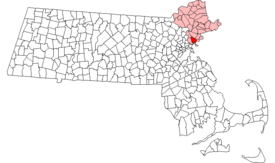Lynn, Massachusetts
| Lynn, Massachusetts | ||
|---|---|---|
| City | ||

|
||
|
||
 Location in Essex County in Massachusetts |
||
| Location in the United States | ||
| Coordinates: 42°28′N 70°57′W / 42.467°N 70.950°WCoordinates: 42°28′N 70°57′W / 42.467°N 70.950°W | ||
| Country | United States | |
| State | Massachusetts | |
| County | Essex | |
| Settled | 1629 | |
| Incorporated | 1850 | |
| Government | ||
| • Type | Mayor-council city | |
| • Mayor | Judith Flanagan Kennedy | |
| Area | ||
| • Total | 13.5 sq mi (34.9 km2) | |
| • Land | 10.8 sq mi (28.0 km2) | |
| • Water | 2.7 sq mi (6.9 km2) | |
| Elevation | 30 ft (9 m) | |
| Population (2010) | ||
| • Total | 90,329 | |
| • Density | 8,066.9/sq mi (3,111.5/km2) | |
| • Demonym | Lynner | |
| Time zone | Eastern (UTC-5) | |
| • Summer (DST) | Eastern (UTC-4) | |
| ZIP code | 01901–01905 | |
| Area code(s) | 339 / 781 | |
| FIPS code | 25-37490 | |
| GNIS feature ID | 0613376 | |
| Website | www |
|
Lynn is the largest city in Essex County, Massachusetts. Situated on the Atlantic Ocean, approximately 10 miles (16 km) north of downtown Boston, Lynn is part of Greater Boston's urban inner core. A former industrial center, Lynn was long colloquially referred to as the "City of Sin," owing to its historic reputation for crime and vice. Today, however, the city is known for its large international population, historic architecture, downtown cultural district, loft-style apartments, and public parks and open spaces, which include the oceanfront Lynn Shore Reservation; the 2,200-acre, Frederick Law Olmsted-designed Lynn Woods Reservation; and the High Rock Tower Reservation. The city also is home to the southernmost portion of the Essex Coastal Scenic Byway,Lynn Heritage State Park, and the National Register-listed Diamond Historic District.
Prior to European colonization, the area today known as Lynn was inhabited by the Agawam tribe of Native Americans. European settlement of the area was begun in 1629 by Edmund Ingalls (d. 1648), followed by John Tarbox of Lancashire in 1631, whose descendants still reside in New England. The city was originally incorporated in 1631 as Saugus, the Nipmuck name for the area. The name Lynn was given to the area after King's Lynn, Norfolk, England, in honor of Samuel Whiting. A noteworthy colonist, Thomas Halsey left Lynn to settle the eastern end of Long Island and founded the town of Southampton, New York. The resulting Halsey House—the oldest extant frame house in New York State (1648)--is now open to the public, under the aegis of the Southampton Colonial Society.
...
Wikipedia


